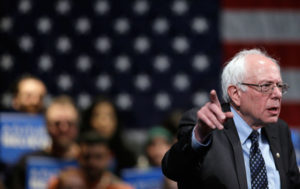Thomas Piketty: Bernie Sanders Heralds a New Era in American Politics
“In many respects, we are witnessing the end of the politico-ideological cycle opened by the victory of Ronald Reagan at the 1980 elections,” writes French economist Thomas Piketty, whose 2014 book “Capital in the Twenty-First Century” made inequality a respectable topic of conversation among professionals and beltway pundits. Economist Thomas Piketty sees a possibility for the end of American market fundamentalism that began with Ronald Reagan. (thierry ehrmann / CC-BY-2.0
)
Economist Thomas Piketty sees a possibility for the end of American market fundamentalism that began with Ronald Reagan. (thierry ehrmann / CC-BY-2.0
)
“In many respects, we are witnessing the end of the politico-ideological cycle opened by the victory of Ronald Reagan at the 1980 elections,” writes French economist Thomas Piketty, whose 2014 book “Capital in the Twenty-First Century” made inequality a respectable topic of conversation among professionals and beltway pundits.
Piketty writes at The Guardian via Le Monde:
Let’s glance back for an instant. From the 1930s until the 1970s, the US were at the forefront of an ambitious set of policies aiming to reduce social inequalities. Partly to avoid any resemblance with Old Europe, seen then as extremely unequal and contrary to the American democratic spirit, in the inter-war years the country invented a highly progressive income and estate tax and set up levels of fiscal progressiveness never used on our side of the Atlantic. From 1930 to 1980 – for half a century – the rate for the highest US income (over $1m per year) was on average 82%, with peaks of 91% from the 1940s to 1960s (from Roosevelt to Kennedy), and still as high as 70% during Reagan’s election in 1980.
This policy in no way affected the strong growth of the post-war American economy, doubtless because there is not much point in paying super-managers $10m when $1m will do. The estate tax, which was equally progressive with rates applicable to the largest fortunes in the range of 70% to 80% for decades (the rate has almost never exceeded 30% to 40% in Germany or France), greatly reduced the concentration of American capital, without the destruction and wars which Europe had to face. […]
All this change sparked a muscular opposition, particularly among the financial elites and the reactionary fringe of the white electorate. Humiliated in Vietnam, 1970s America was further concerned that the losers of the second world war (Germany and Japan in the lead) were catching up at top speed. The US also suffered from the oil crisis, inflation and under-indexation of tax schedules. Surfing the waves of all these frustrations, Reagan was elected in 1980 on a program aiming to restore a mythical capitalism said to have existed in the past.
The culmination of this new program was the tax reform of 1986, which ended half a century of a progressive tax system and lowered the rate applicable to the highest incomes to 28%.
Democrats never truly challenged this choice in the Clinton (1992-2000) and Obama (2008-2016) years, which stabilized the taxation rate at around 40% (two times lower than the average level for the period 1930 to 1980). This triggered an explosion of inequality coupled with incredibly high salaries for those who could get them, as well as a stagnation of revenues for most of America – all of which was accompanied by low growth (at a level still somewhat higher than Europe, mind you, as the old world was mired in other problems). […]
Sanders’ success today shows that much of America is tired of rising inequality and these so-called political changes, and intends to revive both a progressive agenda and the American tradition of egalitarianism. Hillary Clinton, who fought to the left of Barack Obama in 2008 on topics such as health insurance, appears today as if she is defending the status quo, just another heiress of the Reagan-Clinton-Obama political regime.
Continue reading here.
—Posted by Alexander Reed Kelly.
Your support matters…Independent journalism is under threat and overshadowed by heavily funded mainstream media.
You can help level the playing field. Become a member.
Your tax-deductible contribution keeps us digging beneath the headlines to give you thought-provoking, investigative reporting and analysis that unearths what's really happening- without compromise.
Give today to support our courageous, independent journalists.






You need to be a supporter to comment.
There are currently no responses to this article.
Be the first to respond.